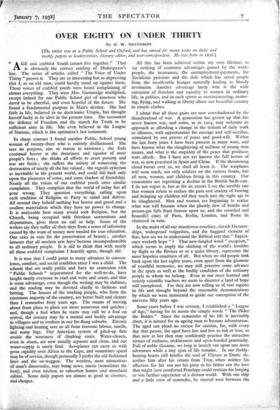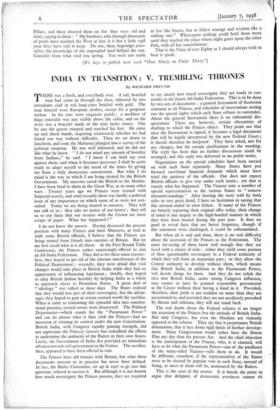OVER EIGHTY ON UNDER THIRTY
By H. W. NEVINSON
[The writer was at a Public School and Oxford, and has served for many years on daily and weekly papers as leader-writer, literary editor, and war-correspondent. He was born in 5856.] AGE and crabbed Youth cannot live together." That is obviously the correct reading of Shakespeare's line. The series of articles called " The Voice of Under Thirty " proves it. They are so interesting but so depressing that I, as an old man, could hardly stand up against them. Those voices of crabbed youth were heard complaining of almost everything. They were Mrs. Gummidge multiplied, except indeed for one Public School girl of nineteen who dared to be cheerful, and even hopeful of the future. She found a fundamental purpose in Man's destiny. She had faith in life, believed in no doctrinaire Utopia, but thought herself lucky to be alive in the present time. She accounted the defence of Freedom and the search for Truth to be sufficient aims in life. She even believed in the League of Nations, which is like optimism's last testament.
In sharp contrast I found another Public School young woman of twenty-three who is entirely disillusioned. She sees no purpose, aim or reason in existence ; she feels continual horror at the dreariness and squalor of most people's lives ; she thinks all efforts to avert poverty and war are futile ; she suffers the misery of witnessing the destruction of nearly all she has valued ; she regards cynicism as inevitable in the present world, and could fall back only upon the pleasures of sense, and some shadow of friendship. Nearly all the voices of our crabbed youth utter similar complaints. They complain that the world of today has all gone wrong. They question everything, calling upon each tradition of Religion or Party to stand and deliver. All around they behold nothing but horror and.greed and a soulless materialism which they have no power to change. It is noticeable how many would seek Religion, but the Church, being occupied with frivolous contentions and disputations, gives them no call or help. Some of the writers say they suffer all their days from a sense of inferiority caused by the want of money now needed for true education. One cries in vain for the preservation of beauty ; another laments that all modern arts have become incomprehensible to all ordinary people. It is sad to think that with nearly all these crabbed complaints I heartily agree, though old.
It is true that I could point to many advances in conven- ience, comfort, and social condition since I was a child. The schools that are really public and have no connexion with " Public Schools " sequestrated for the well-to-do, have taught nearly everyone to read and write and count, and that is some advantage, even though the writing may be dubious, and the reading may be devoted chiefly to fashions and betting. The houses of the working people, who form the enormous majority of the country, are better built and cleaner than I remember forty years ago. The means of moving about from place to place are more numerous and quicker ; and, though a fool when he starts may still be a fool on arrival, the journey may be a mental and bodily advantage to villagers and to workers in our far-flung suburbs. Electric lighting and heating save us all from tiresome labour, smells, and many fogs. Our American system of piled-up flats avoids the weariness of climbing stairs. Water-closets, even in slums, are now usually separate and clean, and our water-supply is rarely fatal. Aeroplanes can carry us with great rapidity over Africa to the Cape, and sometimes speed may be of service, though personally I prefer the old-fashioned liner and the ox-waggon. The wireless, most miraculous of man's discoveries, may bring news, music (sometimes the best),.and even wisdom to suburban homes and moorland cabins. Some daily papers are almost as good as cinemas, and cheaper. All this has been achieved within my own lifetime, to say nothing of economic advantages gained by the work- people, the insurances, the unemployment-payments, the Socialistic pensions and the dole which has saved people from the insufferable hunger naturally leading to bloody revolution. Another advantage lately won is the wide extension of freedom and equality to women in ordinary life, in politics, and in such sports as mountaineering, motor- ing, flying, and walking at liberty about our beautiful country in simple clothes.
I admit that all these gains are now overshadowed by the thundercloud of war. A generation has grown up that has never known war, and some, as in 1914, may welcome its approach as affording a change in the tedium of daily work or idleness, with opportunities for courage and self-sacrifice, stimulated by our priests of peace and good-will. Within the last forty years I have been present in many wars, and have known what the slaughtering of millions of young men means, and what is the stupidity of the peace that produces wars afresh. But I have not yet known the full horror of war, as now practised in Spain and China. If the threatening cloud bursts over us, we shall all learn it. The warplanes will soon teach, not only soldiers on the various fronts, but all men, women, and children living in this country. Our economists are regretting a decline in the British birth-rate. I do not regret it, but as for its causes I see the terrible one that women refuse to endure the pain and anxiety of bearing and bringing up children till they reach just the right age to be slaughtered. Men and women are beginning to realise what war will become when the ghastly dew of bombs and poison-gas falls from heaven upon us, and the crowded and beautiful cities of Paris, Berlin, London, and Rome lie shattered in ruin.
In the midst of all our murderous cruelties, slavish Dictator-. ships, widespread vulgarities, and the haggard element of fear, how are we to understand the Biblical text that " Experi- ence worketh hope " ? That new-fangled word " escapism," which seems to imply the shirking of the world's troubles by flight to the Riviera or to a quiet library, represents the most hopeless condition of all. But when we old people look back upon the last eighty years, even apart from the glamour of youthful memories, we may still perceive some advance in the spirit as well as the bodily condition of the ordinary people to whom we belong. Even in our most learned and strictly scientific teachers we seem to discover a land of hope still unexplored. For they are now telling us of vast regions in life and thought beyond the reasonable demonstrations by which we were instructed to guide our conception of the universe fifty years ago.
Some years before I was seventy, I established a " League of Age," having for its motto the simple words " The Older the Bolder." Since the remainder of his life is inevitably short, it is natural for an ageing man to become adventurous. The aged can plead no excuse for caution, for, with every day that passes, the aged have less and less to risk or lose, so that now at last they may confidently practise the attractive virtues of rashness, recklessness and open-handed generosity. Full of noble illusions, we long to launch out upon one more adventure while a tiny span of life remains. In our feebly- beating hearts still kindles the soul of Ulysses as Dante de- scribes him after his return from Troy, when neither his affection for his son nor his piety to his father nor the love that might have comforted Penelope could restrain his longing to win further experience of a distant world. With one ship and a little crew of comrades, he steered west between the Pillars, and there cheered them on (for they were old and slow), saying to them : " My brothers, who through thousands of perils have reached the West at last, it is but a little vigil . your lives have still to keep. Do not, then, begrudge your- selves the knowledge of the unpeopled land behind the sun. Consider from what seed you spring. You were not made to live like brutes, but to follow courage and wisdom like a sinking star." Whereupon nothing could hold them more until they reached the place where night gazes upon the other Pole, with all her constellations. That is the Voice of over Eighty as I should always wish to hear it speak.
[We hope to publish next week "Over Ninety on Under Thirty."]










































 Previous page
Previous page